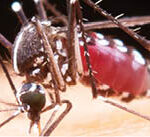
Last week, I attended the Multilateral Initiative on Malaria (MIM) conference in Dakar, Senegal, where researchers from across the African continent convened to share their contributions to the fight against malaria.
As a scientist, it was inspiring to see how innovations such as insecticide treated nets and Artemisinin combination therapy (ACTs) are saving lives and protecting vulnerable populations from this devastating disease.
Yet the overall picture of progress against malaria was sobering, particularly in my home country, Nigeria.
Nigeria has the highest proportion of malaria cases globally, followed by the Democratic Republic of Congo and India.
Though the country has made strides in protecting its citizens from this preventable and treatable disease, progress has come to a halt, and has even shown early signs of reversal.
For example, Nigeria saw an increase of 1.1 million people affected by malaria from 2015 to 2017.
Not only has the number of cases increased, but the country also accounts for the highest proportion of malaria deaths globally.
In 2016, Nigeria took a hard stand against the disease and decided to change its strategy from malaria control to elimination. In order to do this, the country must hit a key target called “pre-elimination” by 2020, which means the number of malaria cases will need to be significantly reduced in the next two years.
On World Malaria Day, it’s important to take stock of how far we’ve come, and identify the challenges that remain along Nigeria’s path to elimination.
The good news
Over the past decade, there have been a number of gains in controlling the spread of the disease in Nigeria, thanks to renewed political commitments, increased funding, private sector engagement, timely reporting of malaria control efforts and overall better coordination of innovative strategies.
In the 2000’s, there was no private sector involvement and now there’s a comprehensive strategy for private sector engagement, improved partner coordination and unified annual planning among all stakeholders. The country has also seen an increase in the number of long-lasting insecticidal nets (LLINs) used by those at risk for malaria, one of the World Health Organization’s core prevention tools.
Hurdles in the Fight Against Malaria
Yet there are always two sides to every coin. While we’ve witnessed an increase in use and distribution of life-saving tools such as LLINs, coverage levels and access are still below the country’s targets. For example, 55% of the population have access to bed nets, a figure which is below the country’s target of 100%.
Another critical component to one day eliminating the disease is Nigeria’s ability to track malaria in the country and within its borders.
Accurate surveillance systems allow stakeholders to effectively map out gaps in coverage, stop outbreaks, monitor for resistance and track progress. With this knowledge, governments are well placed to take appropriate action and protect their citizens.
Yet in Nigeria, surveillance systems detect less than 20% of all malaria cases, which is significantly lower than other malaria-endemic countries.
As I discussed these sobering challenges with the world’s leading malaria experts last week in Dakar, I couldn’t help but ask: is malaria elimination a reality or a myth?
How have countries made elimination a reality?
For Nigeria’s dream of elimination to become a reality, we must look to countries that have already successfully eliminated the disease, such as Sri Lanka and Uzbekistan.
These countries bolstered their domestic funding and intensified a range of strategies, including controlling the spread of mosquitoes within irrigation and agricultural projects, identifying new classes of insecticides for indoor spraying and spraying high-risk areas through entomological surveillance.
Another core intervention that led to these successes was their prioritization of data at all levels.
For example, the timely detection of active malaria cases has proven integral to track the disease’s spread. With better data on active cases, Nigeria can better protect those living in high-risk areas and in hard to reach populations that have poor access to diagnostics and treatment.
In broader terms, there is a real need to prioritize accurate data to support effective surveillance systems.
A strong surveillance system requires high levels of access to care and complete reporting by all health sectors, whether public or private. Not only do these systems help the government make impactful and evidence-based decisions, they are one of our strongest tools we have to combat growing resistance to antimalarial drugs.
Reports of drug resistance are already common place in South East Asia. Experts now fear that resistance could spread to the African continent, which could significantly set back gains made throughout the last decade.
Perhaps the most important factor that has driven many countries to eliminate the disease is the dedicated support and full ownership of their country governments. Nigeria must follow suit and continue to take action and responsibility for the burden of malaria on its citizens.
This means that domestic financing for malaria programs must increase, as its current levels are insufficient to eliminate the disease and cause the government to rely heavily on donor funding.
This World Malaria Day, I call on Nigeria to follow the path of many countries’ who have eliminated the disease, so that we too can make eliminating malaria a reality, not a myth.
Dr. Ify Aniebo is a molecular geneticist, focusing on malaria drug resistance. She holds a PhD in Clinical Medicine and Infectious Tropical Diseases at the London School of Hygiene and Tropical Medicine. She is a 2012 graduate of the University of Oxford’s MSc in Global Health Sciences program, where she was an ExxonMobil Global Health Scholar.
 Join Daily Trust WhatsApp Community For Quick Access To News and Happenings Around You.
Join Daily Trust WhatsApp Community For Quick Access To News and Happenings Around You.

